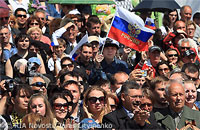Visiting Russians at home

(Russia Beyond the Headlines – rbth.ru – Anna Trofimova, RBTH – February 2, 2014)
RBTH has selected the most widespread traditions and stereotypes linked to Russian hospitality.
It is no secret that foreigners sometimes associate Russia with everlasting cold, bears, vodka and the rudeness of its people. So much for the stereotypes. But what kind of welcome really awaits you if you decide to go to Russia? RBTH explains.
Russians’ oddest customs as seen by foreigners
1. Taking their shoes off after entering a house or apartment.
2. The lack of any form of address such as “sir” or “madam,” and the speed with which they move to familiar forms of address.
3. The abundance of food served: if you’re invited for a cup of tea, it’s best not to eat beforehand.
4. Never throwing anything away and hanging on to a lot of stuff they don’t need.
5. Talking loudly.
Openhearted, trustworthy and hospitable are just a few of the adjectives foreigners use when sharing their impressions of Russia and Russians. The majority agrees, however, that your first trip might not go well if you don’t know at least one Russian-speaking person in Russia, who could act as your guide for a few days.
Making friends with Russians can be tricky: despite their openheartedness and willingness to help at any time, the Russians are a closed people and might only call someone a friend after associating with them for many years. If, even so, you are fortunate enough to be asked round to someone’s home, be sure to do your homework: visiting is a ritual in itself.
If a Russian decides to ask you to tea, the invitation will probably go something like this: “So, around 5 or 6, whenever you like. Can you make Saturday? No? Ok, so let’s make it Sunday. I don’t mind either way.” Russians do not have the concept of tea at five p.m. or family lunch on Sunday. They’re used to fitting in with what the other person wants and expect that person to do the same.
Make sure you have a present for your host- something like a cake or sweets to have with the tea. If they have children, it’s worth buying each child a little treat, something to eat or play with (you don’t want the children to be nuisance during the visit).
RBTH has already written about why Russians tend not to smile. It’s not because they are discontented or angry with someone. It’s just that Russians have a thousand ways of smiling that not every foreigner can recognize. So rest assured, your Russian acquaintance is pleased to see you!
What strikes most foreigners first is the Russian tradition of taking your shoes off when you enter someone’s home. Your hosts will most probably have several pairs of slippers especially for visitors.
No doubt, you will then be shown around the whole house and into every room. Don’t be surprised at e end of your “tour” to be asked to stay in the kitchen-that’s where Russians usually eat, drink tea, do the cooking and the washing up, everything basically that involves food. As rule, the dining room is only used on high days and holidays.
Your hosts are likely to have set the table before you arrive. Setting the table Russian-style means making several types of salad, having any hot dishes ready and cutting up appetizers. Most probably, your acquaintance will keep reminding you not to stand on ceremony and to have some more, which is why there’s no point eating before you go.
[featured image is file photo of random crowd in Russia]
Be prepared for lengthy conversations about life, politics, Mrs. so-and-so next door, the children, destiny and Dostoyevsky, everything and anything under the sun. Russians love to talk. It’s great if you can keep the conversation going and even debate the suggested topic – Russians love lengthy discussions.
Don’t wait for your Russian friend to suggest it might be time to go home, either. He may keep you talking until late in the night, offering you food all the while, and then ask you to stay over. Keep an eye on the time! When you do manage to persuade your host to let you go, don’t forget to say thank you for a lovely evening and to promise that you’re looking forward to him coming to visit you. As for how to make him welcome and what to expect of him-well, now you know!
Article also appeared at http://rbth.ru/arts/2014/02/02/visiting_russians_at_home_33753.html
